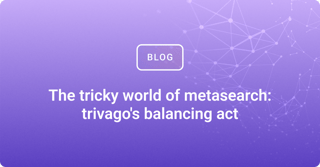The way travelers book hotels is being rewritten in real time: according to SEMRush, AI search traffic will surpass traditional traffic by 2028. And regardless of what the future holds, it’s clear that AI is already influencing how travelers research, choose, and even book hotels, with applications like Google’s AI summaries and ChatGPT playing a key role in many customers’ journey. If your website isn’t AI-ready, you’re losing bookings to OTAs—even when guests want to book direct.
In a recent webinar, we dove deep into GEO (Generative Engine Optimization), which is the newest iteration of SEO. The ultimate goal of GEO? To make you visible and accessible to these powerful search tools. Chimmy Kalu (Staff Product Designer at Triptease) spoke about the changes that AI is bringing to the way that guests search for and book travel. Joined by Triptease Product Marketing Manager Genevieve Horchler, who has a background in SEO at big brands including Expedia, she gave specific, tactical changes that hotels can make to succeed in this new world of search.
Old Search vs New Search
Not long ago, the traveler journey looked like this:
- Dream: Using social media, paid and organic internet searches, blogs, and word-of-mouth/offline marketing to get travel inspiration.
- Research: Check out the hotel website for overall atmosphere, images, policies, amenities, room sizes etc. and OTA sites for price comparison.
- Book: Booking via an OTA or direct website.
With the increased adoption of AI, the “dream” and “booking” stages look fairly similar. What’s really changing is the research step. Guests are using tools like ChatGPT to learn things that traditionally they might have found on a hotel website. Hotels should be focusing on one key goal when it comes to GEO: that when a guest asks a generative search engine a question, direct websites are coming up first.
With traditional search, potential guests would google things like “hotels with a view in Tokyo,” click through OTA pages, compare rates, and eventually land on your site.
Now they ask ChatGPT:
“Find me hotels with bathtubs and skyline views in Tokyo, under £150, for couples.”
And the AI returns answers—not links (although this may be changing). So if your property isn’t structured and optimized for this new type of search, it’s hard to show up in this new ecosystem.
5 Recommendations to Make Your Hotel Site AI-Ready
The good news is that optimizing for AI makes your website better in other ways too. Many of the key factors for AI readability are also key to user experience and accessibility. Here are Chimmy’s top tips for making sure your website ticks all the boxes.
- Make sure your pages make sense when scanned as well as when read
Follow HTML best practices (like incorporating proper heading structures), use schema to organize your web pages, and label rooms and rates clearly to ensure that AI and human eyes can both easily interpret your website.
- Make media readable without eyes
If your visuals are invisible to screen readers or bots, they don’t exist in the eyes of AI tools. To succeed on this point, make sure that your images include alt text and that videos have captions and transcripts.
- Answer the questions that real guests are asking
AI agents love direct answers. Build out FAQs, or go the extra step and create dedicated pages to answer top guest questions. You can find the best questions to answer by looking at Google’s People Also Ask section, making use of search listening tools like Answer the Public, and of course, liaising with the people at your front desk to find out what questions they’re hearing from guests. - Build hyper-specific content
“Hotel with rooftop yoga in Barcelona” will beat “Best hotel in Spain” every time. Create niche pages with keywords specific to your offerings, and you’re more likely to get AI searches landing guests on your direct site. - Use trust cues to build authority
Showcase guest reviews and photos on your website and update them frequently, as AI agents increasingly weigh freshness and guest sentiment. One tip from Chimmy? Even if you don’t update the page fully, making small edits and adding “last updated” dates can still help to indicate freshness.
How hotels can start preparing
Optimizing for AI search can feel overwhelming, so here are some key jumping-off points:
- Run a real AI test: Ask ChatGPT, Claude, or Perplexity prompts that you’d expect your hotel to show up for. What comes up?
- Audit your website structure: Poor website structure means poor AI visibility. Review heading tags, schema, alt text, and other key elements.
- Find out what questions guests are asking about hotels: Use Google Search Console, “People Also Ask” in social listening, or even OTA Q&A sections to discover FAQs worth answering.
- Start creating FAQs to address real traveler questions: Use your own team’s experience and feedback to create hyper-relevant FAQs that address the things your customers actually care about.
As a starting point, Chimmy’s created a GEO checklist that lists out all this–and more–to help you get started.
Watch the full webinar to build out your GEO toolkit
While this blog gives a helpful overview, Chimmy addressed so much more in our June webinar. Access the full recording here to learn everything you need to know about GEO, and how you can maintain and grow your visibility in this new world
Get in touch with our direct booking experts
Genevieve is a product marketing manager at Triptease.



.png?width=320&height=320&name=Feature-Image_%5BQuick%20hotel%20strategy%20tips_%20Must-read%20insights%20for%20July%2025%5D%20(1).png)



![[WATCH] How hotels can win on Paid Search in 2022](https://www.triptease.com/hs-fs/hubfs/Resources%20-%20feature%20images/Feature-Image_%5B%5BWATCH%5D%20How%20hotels%20can%20win%20on%20Paid%20Search%20in%202022%5D.png?width=320&height=320&name=Feature-Image_%5B%5BWATCH%5D%20How%20hotels%20can%20win%20on%20Paid%20Search%20in%202022%5D.png)
